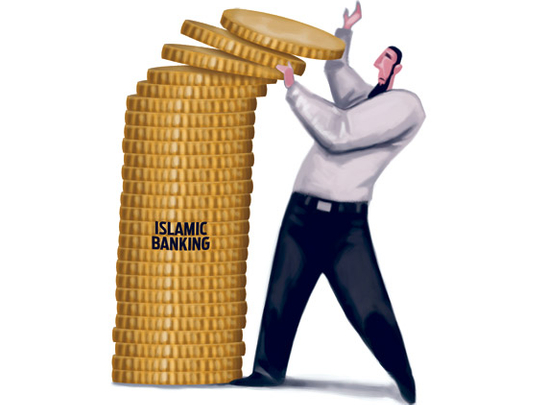
A newspaper in London, an acknowledged hub for Islamic finance, ran an eye-catching headline recently: "After six years, Sharia-compliant bank products are ‘huge flop'."
The jury is still out on embryonic Islamic finance industry in London, but using the micro-cap sized Islamic Bank of Britain (IBB), on which the Times based its story, shows more about the company and its offering than it does about the state of Islamic finance in a non-Muslim country. IBB's situation may be more about the consequence of cheerleading Islamic finance by emphasising quantity — the opportunity presented by two million Muslims in the UK — over quality. That strategy, obviously may not have been bankable.
A quick glance at retail banking in Islamic finance hubs like Bahrain, UAE, Malaysia, reveals that the Islamic finance industry has not surpassed 30 per cent market share. In Malaysia, the majority of Islamic finance customers are not Muslims but ethnic-Chinese. On that basis, how does the industry take the seemingly success of Islamic finance in Malaysia to UK?
Economic immigrants
The majority of the UK Muslim's are from the Indian subcontinent (India, Pakistan, Bangladesh, etc). They came seeking better economic opportunities, education for their children, and upward mobility. These immigrants came from countries where Islamic finance was, at best, more of a theory and less of a practice in the 1960s and 1970s. Finally, the UK Islamic banking experience, from Albaraka to United Bank of Kuwait to (now) Islamic Bank of Britain, resulted in a general levelled regulatory and tax playing field, but even that has not opened the floodgates to Islamic finance. Why?
First, the UK Government has been talking about a sovereign Sukuk for few years, yet, to date, nothing has materialised. Post Prime Minister Tony Blair, each successive government has stated their enthusiast commitment and firm support for Islamic finance, and, yet, the industry still awaits for this ‘magical' sukuk. Yes, the credit crisis has provided set-backs, but lets hope it's not an opportune excuse for further delays. France's recent interest in being an Islamic finance hub and comments about a corporate benchmark Sukuk could actually pressure UK to issue a sovereign Sukuk before Paris.
Islamic finance not taking off at the retail level in UK, or another G20 country, may be attributed to a variety of factors:
1. Lack of interest in Islamic finance and comfort with conventional finance, from those who believe a certain type of ‘interest' is acceptable.
2. Islamic finance offerings are too expensive.
3. Islamic finance, as presently offered, is not ‘Islamic' enough.
4. Scholars signing off on products may not be locally known.
5. Providers are not responsive to the needs of the bankable masses;
6. In post 9/11 environment, certain Muslims are concerned that if they partake in Islamic finance, they will be on some government watch-list.
Another theory has to do with the Muslims' debt averse mindset, but here, in the UK, you have an ‘Islamic' debt offering, like Islamic mortgages. The anti-debt mindset may be a cultural influence and/or literal interpretation from the Quran: permissibility of trade and prohibition against interest (2:275-79).
We have all read and heard about countless stories concerning UK Muslims living and operating in cash economy, renting apartments, and accumulating enough savings over the years/decades to finally buy a home in cash.
We have all heard about the need of education about Islamic finance, be it seminars, workshops, conferences, newsletters, industry organisation, on-line courses, etc. Yet, the low uptake of Islamic products may be due to an incomplete education and understanding, which results in a much longer buy-in cycle than expected.
What about all the surveys and questionnaires about Islamic finance as basis for the offerings? The possibility of survey and interview bias must be factored into the formula. During the surveying of the ‘man on the street' there may not have been a conscious awareness of minimising leading questions and minimising impact of ‘politically correct' answers. It would seem the UK Muslims, like any other Muslim or non-Muslim interested in Islamic finance, wants a broad spectrum of products at market prices with comparable customer service and support.
Back to basics
The stakeholders pushing Islamic finance may need to have a reality check concerning retail offering in non-Muslim countries with an established Muslim minority. The enthusiasm Islamic bankers have for Islamic finance may not be shared by a percentage of Muslims at the retail level.
The Islamic bankable population may be quite small, hence, requiring better understanding of the demand, right mix of product offering, distribution channels, and support service.
The ‘huge flop' headline comment is the needful wake-up call for Islamic finance on the true market size and opportunity plus managing demand expectations. Obviously, something is broke here, and we need to move out of the cheerleading ‘comfort zone' and into the reality of lack of interest by Muslims (man on the street) in Islamic Finance.
Ok, step 1: Erase the existing formulas, diagrams and charts off the blackboard, and start fresh with a better and realistic understanding of the demand for bankable retail Islamic finance in the UK.
The writer is Global Head of Islamic Finance at Thomson Reuters. Views expressed here are his own and do not necessarily reflect that of his organisation or of Gulf News.












